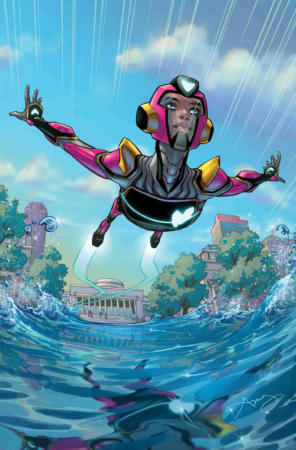Comic books have been battlegrounds for issues of social justice and identity— and for good reason. What qualities deem someone as worthy to be a hero speaks volumes in the real and fantasy world.
That’s true of Ironheart #1, the first installment of a series following Riri Williams, an engineering student at MIT who moonlights as a superhero, equipped with her very own armor that she designed herself.
Riri first debuted in Invincible Iron Man as an amateur inventor who gets a co-sign from Tony Stark himself, but this is her first time leading a series. This past summer, Marvel announced that Eve Ewing –a writer, artist and sociology professor at the University of Chicago, best-known for her book, Electric Arches—would be writing the series.
We’re first introduced to Riri as she’s flying through the sky in her suit, musing on her personal history, the death of her father, and how she will step into her newfound role as a hero. Upon her arrival to MIT’s campus, she’s greeted by the school’s dean who is in her lab showing off her inventions to a group of visiting world leaders. During her impromptu presentation, one of Riri’s inventions malfunctions causing her to be scolded and left alone sulking. That sulking was quickly interrupted when the building is locked down and the world leaders are attacked, forcing Riri to spring into action and save the day.
The story doesn’t stray too far from convention—an unlikely hero with a tortured history—but what emerges is a smart examination of optics. Riri Williams is inextricably a woman, a young Black woman, and as much as she needs to figure out what her role is for herself, she is also navigating how the world sees her.
In addition to the writing, the artwork is sleek and compelling. Riri’s suit is reminiscent enough of Tony Starks but still unique and identifiable.
The installment though, is not without its flaws. The pacing is slowed down by several moments of reflection, which provide a window into what Riri is feeling, but are not as illuminating about her personality as the moments of action and when she’s interacting with other characters.
Riri remains a compelling lead while maintaining her witty and cocky side at times. Her doubts about being a hero, and her penchant for being emotional, feel like plot points ripe for exploration. Most importantly, she feels like a character that’s lived in. Her experiences, colloquialisms, and cultural touchstones feel authentic. This is to the merit of Ewing, who bears some connections to Riri, also being a Black woman from Chicago.
“I’m honored that I get to tell you who Riri is, where she’s going, what drives her and how she’s gonna make her mark on the Marvel Universe,” wrote Ewing. “And rest assured, make her mark she will.”
We’ll see the kind of mark she makes.
The next installment of Ironheart arrives January 19.

